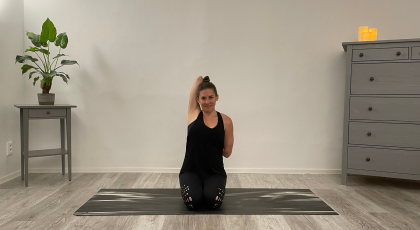View basket (0 items $0.00)

Yoga for Women's Health - Restoring Hormonal Balance
Lynn Jensen is a renowned author and yoga teacher, specializing in Yoga for Fertility, and Yoga for Healthy Hormones. She is the founder of the Seattle-based Yoga for Fertility program and she has helped more than two thousand women and couples to overcome fertility challenges. Lynn’s teachings were part of a research study funded by the National Institute of Health. In this interview with Yoga U Online, Lynn discusses the many signs and symptoms of hormonal imbalance and how and why yoga asanas can be extremely helpful in fostering greater hormonal balance.
Yoga U Online: How did you come to specialize in yoga for women’s health with a specific focus on hormonal balance?
Lynn Jensen: I became very interested in yoga for fertility through my own fertility challenges. I had, at that time, already been doing yoga for a number of years and teaching for a few as well. I realized that nobody was offering anything to do with yoga for fertility, and it would be helpful to have a kind of yoga that specifically supported women who were going through that. I began to teach prenatal yoga and postnatal yoga, and then yoga for midlife women classes because a lot of what I was doing with yoga for fertility was working with the endocrine system, working with hormonal balancing because it’s so crucial in women who are facing fertility issues. That segued into teaching yoga for midlife women, and then I was invited to put together a program, a design of yoga sequence, and teach the classes for the Yoga for Hot Flashes study for the National Institute of Health.
Yoga U Online: Your work with yoga programs targeting the endocrine system led you to teach a program on Yoga for Hormonal Health. If someone had the suspicion that they might have hormonal imbalance, what would be some of the indicators?
Lynn Jensen: Some things to ask yourself: Do I have mood swings? Do I have a lot of time where I'm feeling anxious, low, negative? Am I having trouble sleeping? Some glands in the endocrine system are specifically impacting your sleep cycles, such as the pineal gland in the back of the head. Hormones are extremely powerful actors in the body, so when any of them are out of balance, they can impact a very big range of systems and processes in the body. Mood swings, PMS, insomnia, weight gain, anxiety, depression, and poor immune function can all be related to hormonal imbalance.
Yoga U Online: A lot of those symptoms can also be related to stress. Is there a connection there?
Lynn Jensen: Absolutely, a very big connection. The adrenal glands are the ones that are pumping out stress hormones. If they are pumping out stress hormones twenty-four seven, then all the glands are not getting what they need. Most of the glands are using the same building blocks to produce the hormones. So if the adrenal glands are taking all of the building blocks for these other hormones, then you’re getting deficits in all these other areas. Therefore it’s very important for stress reduction to calm the adrenal glands down, and yoga is great for that.
When I first started working with teaching yoga for fertility, I thought I would go through the endocrine system and I would pick one or two of the glands in the endocrine system that would impact fertility and we would focus on those and then almost throw the rest of them out. During the research, I realized that you can’t do that; every single gland in the endocrine system, when out of balance, can impact fertility and also lead to these other issues such as insomnia and weight gain.
Yoga U Online: How can yoga aid with hormonal imbalance?
Lynn Jensen: Yoga is extremely helpful with these hormonal imbalances because of its design. In fact, every time you’re doing a yoga pose, you are working on at least one of the glands in the endocrine system, and usually more than one. Part of the reason is because yoga is designed to work on the chakra system, and when you look at the chakra system next to the endocrine system, they are exactly lined up. Instead of thinking, “Okay, I'm working on the second chakra,” you can think about, “I'm working on a ovaries,” which is one of the glands in the endocrine system. So, yoga is very much designed to help with the endocrine system and keeping the hormones in balance.
Yoga U Online: How is your approach to teaching different from other yoga teachers?
Lynn Jensen: It’s really about which poses I'm choosing to include in the class and sometimes, the poses that I'm not including in the class. The poses will focus on the places affecting the demographic I’m working with. For instance, if I'm teaching yoga for fertility, we might do a lot of focus on the ovaries as one of the places, pelvic opening poses and also heart opening poses, and balancing the thyroid gland in the throat because that can impact fertility.
The same principle is true when I’m focusing on asanas for the endocrine system. A twist, for example, I describe as wringing out those organs and the glands that are being affected by the twist. When you come out of the twist, you get a great fresh blood supply into that organ or gland, bringing new energy, blood flow, and nutrients into that area. The organs and glands can get stagnant when there’s no blood flow, especially for a lot of us who have really sedentary lifestyles – sitting at a desk all day. We are really revitalizing those glands and organs with the asanas.
Yoga U Online: You have a course in Yoga for Healthy Hormones on Yoga U Online. Tell us more about what that course covers.
Lynn Jensen: In this course, I discuss the relationship between yoga and your hormones. I teach how to recognize when your hormones are out of balance, and how to approach that imbalance using yoga. I talk about the endocrine system itself- what are those key pieces for the endocrine system, how are they tied to stress and the parasympathetic nervous system, and how yoga helps with that.
I talk about how to choose the yoga poses to work with specific symptoms and specific hormonal imbalances, choosing the poses based on the effect on the particular gland or glands in the endocrine system. The course leaves people with a daily practice that they can do that’s specifically oriented to work on general hormonal imbalance.
Featured Courses








